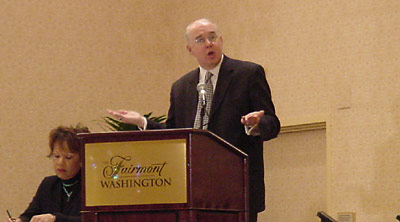The phony space race<< page 1: an unlikely space race The perils of a space raceWhat if, regardless of all the evidence to the contrary, China’s manned space program does become very aggressive and plan manned missions to the Moon? Right now the US government hasn’t taken much of a position about China’s space program. The best one can find is an offhand comment last year by NASA Administrator Sean O’Keefe, who said that he and Richard Armitage, Colin Powell’s deputy at the State Department, had discussed “the art of the possible” about potential future cooperation with China on space. However, one could foresee a change in policy if China picked up the pace of its space efforts, as some seek to draw parallels with the Soviet Union nearly a half-century ago. Achievements in space could be seen as both a way to garner prestige in the international arena as well as demonstrate its military prowess; neither, some claim, the US could allow to go unchallenged. That’s the argument Al Neuharth, the founder of the newspaper USA Today, made in a recent editorial in that paper. Claiming that Americans are now “second raters” in space, he argues that China’s space efforts represent a “really big space shock” in the years to come. “China’s leaders have leaked that they intend to have men on the moon by 2010 and establish a base there,” he writes, apparently unaware of the full story behind those remarks. “When that happens, the shock may be even greater than when the former USSR, Russia's mother country, put Sputnik in orbit in 1957.” Dallas Morning News columnist Rena Pederson was more blunt in a piece published just eight days after the Columbia accident. “Will there be headlines in a decade asking Americans, ‘Who lost space?’”
The argument that Neuharth and Pederson both advance is that Chinese manned space flight activity should be a clarion call to America to counter it with bold new plans. “No president since JFK has recognized that whoever is No. 1 in space ultimately can call the shots on earth,” Neuharth writes. “Before the Chinese shock hits, we should get this dormant gateway to the universe back in big-time business.” Neuharth and others might be well-served by carefully examining the long-term effects of the space race with the Soviet Union. That race was arguably another battle, albeit a peaceful, nondestructive one, in the Cold War. Less than twelve years after the first shot of that battle, Sputnik, was fired, the US could claim victory by landing Neil Armstrong and Buzz Aldrin on the Moon. However, both the Soviet Union and the United States lost interest in manned lunar exploration shortly thereafter, and Apollo coasted to an end as both countries focused resources on other efforts. Apollo, certainly, was both a technical and managerial success: to go essentially from a standing start in 1957 to a full-fledged, successful manned lunar program in just over a decade required both immense technical resources and the expertise to apply those resources appropriately. In the process, though, it build up a bureaucracy, and anyone familiar with government knows that bureaucracies are notoriously resistant to elimination, even after they have accomplished their mission. With a constituency of tens of thousands of NASA employees, and many more private-sector contractors, wanting to stay in business, the government eventually approved the Space Shuttle and, later, the International Space Station. These programs succeeded in keeping the bureaucracy alive and its personnel employed, although they have been to date overall disappointments in furthering space exploration.
The 1960s space race also skewed perceptions of what was possible in space among space activists and the general public alike. Activists have spent years trying to rekindle the excitement of Apollo by proposing similar programs to return to the Moon or go to Mars that offer a “quick fix” rather than a slower-paced, long-term program. The general public, which paid rapt attention to the space program in the 1960s, rarely thinks about it today except in times of great triumph or tragedy; this may be linked to the high expectations the early space program set in the public’s mind. Given what has happened in the three decades since the end of Apollo, one can argue that a high-intensity, short-duration space race like the one between the US and USSR is one of the worst things one can do to advance space exploration short of abandoning it altogether. The 1960s space race created institutions and bureaucracies that needed to be served after the race was over and warped expectations of what a realistic space program was for the worse. And, yet despite all of this, there are people who want to create a new space race with a new opponent. Fortunately, such a race is unlikely. China is proceeding in space in a very methodical, deliberative manner, and seems uninterested in competing with the US in manned space flight in any major way. Even if China ramped up its space efforts, the current geopolitical climate seems far less likely to trigger a race than the Cold War-fueled competition between the US and USSR. Those predicting such a race, and even hoping for one to break out, might be better served by helping craft policies and programs that would benefit the long-term development and use of space for defense, exploration, and commerce. That’s a race well worth winning. Home |
|
